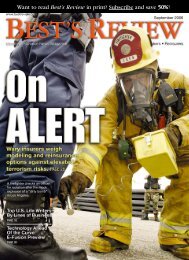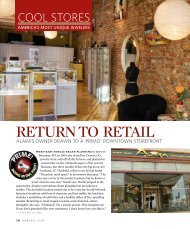Create successful ePaper yourself
Turn your PDF publications into a flip-book with our unique Google optimized e-Paper software.
Roll the dice<br />
<strong>The</strong> <strong>risks</strong> <strong>of</strong> <strong>dealing</strong> <strong>with</strong> <strong>Cuba</strong><br />
6 www.floridashipper.com APRIL 18, 2005
By Nicole Rollender and Janet Plume<br />
John Parke Wright IV and<br />
those other Florida businesspeople<br />
who have chosen to<br />
trade <strong>with</strong> <strong>Cuba</strong>, mostly<br />
through Jacksonville and<br />
Tampa, are justifiably worried.<br />
<strong>The</strong> Florida-based cattle forwarder<br />
and other exporters to <strong>Cuba</strong> assumed<br />
the worst, less than two months ago,<br />
when the Treasury Department<br />
revised regulations for selling food<br />
and medicine to the struggling<br />
Communist country.<br />
<strong>The</strong> revision changed the U.S. government’s<br />
definition <strong>of</strong> a “cash-inadvance”<br />
payment for those exporting<br />
from the U.S. to <strong>Cuba</strong>. <strong>The</strong> move<br />
prompted <strong>Cuba</strong>’s import agency,<br />
Alimport, to threaten to cancel U.S.<br />
shipments, whose value was expected<br />
to reach $1.2 billion by the end <strong>of</strong><br />
this year. In four years <strong>of</strong> limited<br />
trade, <strong>Cuba</strong> had emerged as the U.S.’s<br />
25th-largest export partner.<br />
Since the transition period for the<br />
revised regulation expired March 24,<br />
several shipments to <strong>Cuba</strong> have been<br />
interrupted because <strong>of</strong> an unanticipated<br />
bank holiday and the need to renegotiate<br />
contracts <strong>with</strong> new terms <strong>of</strong><br />
payment. <strong>The</strong> American Farm Bureau<br />
Federation claims that more than<br />
$250 million in food shipments<br />
scheduled <strong>with</strong>in the next six months<br />
to <strong>Cuba</strong> are immediately at risk and<br />
hundreds <strong>of</strong> millions <strong>of</strong> dollars in<br />
future shipments are jeopardized. <strong>The</strong><br />
American Farm Bureau Federation<br />
has joined more than two dozen other<br />
groups supporting proposed legislation<br />
in Congress that would undo the<br />
revision.<br />
According to the producers, shippers,<br />
lawyers and forwarders involved<br />
in the <strong>Cuba</strong> trade, the biggest blow is<br />
to the integrity <strong>of</strong> the U.S. export<br />
community because it forces them to<br />
renege on contracts already signed,<br />
sealed and delivered.<br />
<strong>The</strong> Trade Sanctions Reform and<br />
Export Enhancement Act <strong>of</strong> 2000 lifted<br />
some trade restrictions that had been in<br />
place since the 1963 trade embargo <strong>of</strong><br />
<strong>Cuba</strong> in December 2001. By the end <strong>of</strong><br />
2004, U.S. firms had sold more than<br />
$800 million in food and medical<br />
products and that figure was expected<br />
to increase by half this year.<br />
<strong>The</strong> law specified that <strong>Cuba</strong> could<br />
pay for the goods <strong>with</strong> either letters<br />
<strong>of</strong> credit or cash in advance. <strong>Cuba</strong>’s<br />
Alimport would send its pesos to a<br />
third-country bank, which then would<br />
wire U.S. dollars to the shipper’s<br />
U.S. bank, a process that would take<br />
about three days or about the length<br />
<strong>of</strong> a voyage from a Florida or Gulf<br />
port to Havana.<br />
According to those<br />
involved in the <strong>Cuba</strong> trade,<br />
the biggest blow is to the<br />
integrity <strong>of</strong> the U.S. export<br />
community because it<br />
forces them to renege on<br />
contracts already signed,<br />
sealed and delivered.<br />
Until last month, some shippers<br />
were paid <strong>with</strong> letters <strong>of</strong> credit consisting<br />
<strong>of</strong> two contracts; one in which<br />
an issuing bank promises to pay a<br />
seller for goods or services sold to a<br />
buyer after the bank receives a specified<br />
document such as an invoice, bill<br />
<strong>of</strong> lading or inspection certificate.<br />
<strong>The</strong> second contract is between the<br />
bank and the buyer, who must pay the<br />
bank a fee, which usually varies from<br />
0.75 percent to 3 percent <strong>of</strong> the value<br />
<strong>of</strong> the cargo, for the letter <strong>of</strong> credit.<br />
<strong>The</strong> bulk <strong>of</strong> Alimport’s payments<br />
for U.S. cargo were made according<br />
to the cash-in-advance terms; <strong>Cuba</strong><br />
sent pesos to a third-country bank as<br />
the ship left the U.S. port. Normally,<br />
by the time the vessel arrived in<br />
<strong>Cuba</strong>n waters, the payment had been<br />
received and the wire transfer to the<br />
shipper completed. In some<br />
instances, the vessel would wait <strong>of</strong>fshore<br />
for one or more days while the<br />
transaction was completed.<br />
“This arrangement is unusual in<br />
international trade,” said Lisa<br />
Crosby, a trade attorney <strong>with</strong> Sidley,<br />
Austin, Brown & Wood in<br />
Washington, D.C. “Globally, most<br />
buyers use letters <strong>of</strong> credit.”<br />
Trade experts speculate that previous,<br />
unrelated incidents — in which<br />
<strong>Cuba</strong>n property was seized in the<br />
U.S. to satisfy U.S. court liens won<br />
by <strong>Cuba</strong>n exiles — influenced<br />
Alimport’s decision from the beginning<br />
<strong>of</strong> the food shipments in<br />
December 2001 to time its cash-inadvance<br />
payments in such a fashion<br />
that the transfer <strong>of</strong> ownership <strong>of</strong> the<br />
cargo did not occur until the vessel<br />
was almost in Havana.<br />
<strong>The</strong> difference between this cashin-advance<br />
method <strong>of</strong> payment and a<br />
letter <strong>of</strong> credit is where the liability<br />
lies. In a cash-in-advance payment,<br />
the seller is at risk until the money is<br />
received from the buyer. In a letter <strong>of</strong><br />
credit, the bank assumes that risk.<br />
A letter <strong>of</strong> credit assures the<br />
seller <strong>of</strong> payment before the goods<br />
are shipped or manufactured, even if<br />
the seller doesn’t receive the money<br />
until after the goods are shipped,<br />
according to Leonard Rosenberg,<br />
director at Sandler, Travis &<br />
Rosenberg, a Miami law firm. Under<br />
the old cash-in-advance method for<br />
shipments to <strong>Cuba</strong>, the seller did not<br />
receive payment until the cargo was<br />
under way.<br />
“With a letter <strong>of</strong> credit, the seller<br />
is paid even if the buyer believes that<br />
what it has received does not conform<br />
<strong>with</strong> the order specifications,”<br />
Rosenberg said. “Investigating<br />
and worrying about the credit-worthiness<br />
<strong>of</strong> the buyer is left to the<br />
issuing bank.”<br />
(<strong>Cuba</strong>, continued on Page 74)<br />
APRIL 18, 2005 Florida Shipper 7













